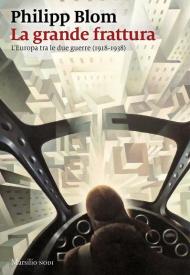
La grande frattura. L'Europa tra le due guerre (1918-1938)
La grande frattura. L'Europa tra le due guerre (1918-1938): Si parla oggi di un ritorno dei totalitarismi senza dar conto della complessità degli anni che portarono alla loro ascesa al potere. Se infatti nel 1914 lo scoppio del primo conflitto mondiale aveva accelerato una serie di cambiamenti già in atto, quattro anni più tardi i traumi della guerra e il vuoto lasciato dalle istituzioni del vecchio regime agirono piuttosto da catalizzatori della modernità, facendo spazio all'avanzata di ideologie e modalità espressive prima impensabili. Per lo storico Philipp Blom, ben attento a non ridurre il proprio oggetto di indagini alla somma di economia e politica, dal 1918 al 1938 il conflitto infatti non si estinse, ma la sua energia venne impiegata in altri ambiti, dando vita a un periodo eccezionale, in cui disillusione, brama di rivincita e completa fiducia in un futuro rivoluzionario convivevano, dove in libreria apparivano i primi racconti di Hemingway, le opere dei Surrealisti e «Il declino dell'Occidente» di Spengler, e al cinema si proiettava «Metropolis» di Fritz Lang mentre per le piazze risuonavano marce e slogan che da lì a poco avrebbero condotto al potere nuovi terrificanti regimi. In questa storia culturale Blom, concentrandosi su alcuni eventi chiave, racconta un'epoca piena di contraddizioni, dove si passò senza soluzione di continuità dal dopoguerra alla preparazione di un nuovo scontro mondiale. We are talking today about a return of totalitarianism without giving account of the complexity of the years that led to their rise to power. If in fact in 1914 the outbreak of the First World War had accelerated a series of changes already underway, four years later the traumas of the war and the void left by the institutions of the old regime acted rather as catalysts of modernity, Making room for the advance of ideologies and expressive modalities previously unthinkable. For the historian Philipp Blom, very careful not to reduce his object of investigations to the sum of economics and politics, from 1918 to 1938 the conflict did not get extinct, but his energy was used in other areas, giving rise to an exceptional period , in which disillusionment, lust for revenge and complete confidence in a revolutionary future coexisted, where in the bookstore appeared the first tales of Hemingway, the works of the Surrealists and "The Decline of the West" of Spengler, and the cinema projected "Metropolis" of Fritz Lang While the squares echoed marches and slogans that soon would lead to power new terrifying regimes. In This cultural history Blom, concentrating on some key events, tells an era full of contradictions, where it passed seamlessly from the post-war period to the preparation of a new World clash.
Prodotto fuori catalogo
Dettagli Libro
- Titolo: La grande frattura. L'Europa tra le due guerre (1918-1938)
- Autore:
- Curatore:
- Traduttore:
- Illustratore:
- Editore: Marsilio
- Collana:
- Data di Pubblicazione:
- Pagine:
- Formato:
- ISBN: 9788829700219
- Non catalogati - Non catalogati






